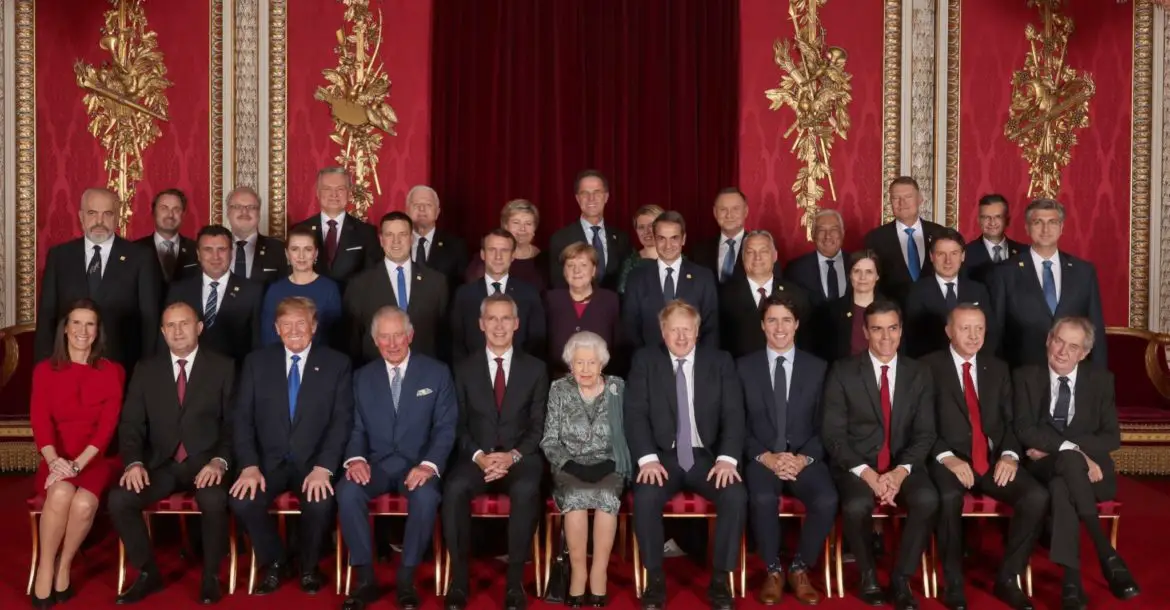
NATO Summit – the war party is growing stronger
by Manlio Dinucci
Emmanuel Macron spoke of NATO as being « brain dead », others qualify it as « dying ». So are we now faced with an Alliance which, with no thinking head, is disintegrating under the stress of its internal fractures ? The disagreements at the London Summit seem to confirm this scenario. But we need to look deeper, at the real interests which are the foundation of the relationships between the allies.
While in London, Trump and Macron argue in full view of the cameras, in Niger, with minimal publicity, the Army of the US Command for Africa (AfriCom) has deployed a fleet of cargo planes to transport thousands of French soldiers and their armament to various outposts in Western and Central Africa for Operation Barkhane, in which Paris has engaged 4,500 soldiers, particularly Special Forces, with the support of US Special Forces in combat missions. Simultaneously, armed Reaper drones, supplied to France by the USA, are operating from Air Base 101 in Niamey (Niger). Reapers from the US Africom Air Force are also taking off from this same base, now redeployed to the new base 201 Agadez in the North of the country, and continue to operate with French forces.
This case is emblematic. The United States, France, and other European powers, whose multinational groups compete for the acquisition of markets and raw materials, call a truce as soon as their common interests are in play. For example, those they have in the Sahel, rich with raw materials - oil, gold, coltan, diamonds, uranium. But now their interests in this region, where poverty levels are among the highest in the world, are in danger from popular uprisings and China's economic presence. This is the reason for Operation Barkhane, which, presented as an anti-terrorist operation, engages the allies in a long-lasting war with drones and special forces.
The stongest element holding NATO together is composed of the common interests of the military-industrial complex on both sides of the Atlantic. These are reinforced by the London Summit. The Final Declaration supplies the main motivation for an ulterior increase in military spending - « The aggressive actions of Russia constitute a threat for Euro-Atlantic security ». The Allies have agreed not only to raise their military expenditure to at least 2 % of their GDP, but also to use at least 20 % of that sum to the purchase of weapons. This objective has already been met by 16 countries out of 29, including Italy. The USA dedicated more than 200 billion dollars to this goal in 2019. The results are clear. On the same day as the NATO Summit opened, General Dynamics signed a contract with the US Navy for 22,2 billion dollars, which may extend to 24 billion, for the supply of 8 Virginia class submarines for special operations and attack missions with Tomahawk missiles, including those with nuclear warheads (40 on submarines).
Accusing Russia (with no evidence) of having deployed medium-range nuclear missiles and therefore of having therefore betrayed the INF Treaty, the Summit decided on « the ulterior reinforcement of our capacity for self-defence with a range of nuclear, conventional and anti-missiles, which we will continue to adapt – as long as nuclear weaponry exists, NATO will remain a nuclear alliance ». Within this framework is included the recognition of space as a fifth field of operations, in other words, it announces a very expensive military spatial programme by the Alliance. It is a blank check offered unanimously by the Allies to the military-industrial complex.
Fot the first time, with the Declaration du Sommet, NATO speaks of the « challenge » due to the growing influence and international politics of China, by emphasising « the need to face up together as an Alliance » [1]. The message is clear – NATO is even more necessary for a West whose supremacy is now challenged by China and Russia. An immediate result - the Japanese government has announced that it has bought the unihabited islsand of Mageshima for 146 millions of dollars. The island is situated 30 kilometres from its coast, and will be used to create a training site for for US fighter-bombers based to protect against China.
il manifesto, 07 December 2019
Translator: Pete Kimberley
DECLARATION OF FLORENCE
FOR AN INTERNATIONAL FRONT NATO EXITDANSK DEUTSCH ENGLISH ESPAÑOL FRANÇAIS ITALIANO NEDERLANDS
PORTUGUÊS ROMÎNA SLOVENSKÝ SVENSKA TÜRKÇE РУССКИЙ
PORTUGUÊS ROMÎNA SLOVENSKÝ SVENSKA TÜRKÇE РУССКИЙ
Manlio Dinucci
Geographer and geopolitical scientist. His latest books are Laboratorio di geografia, Zanichelli 2014 ; Diario di viaggio, Zanichelli 2017 ; L’arte della guerra / Annali della strategia Usa/Nato 1990-2016, Zambon 2016, Guerra Nucleare. Il Giorno Prima 2017; Diario di guerra Asterios Editores 2018, Premio internazionale per l'analisi geostrategica assegnato il 7 giugno 2019 dal Club dei giornalisti del Messico, A.C.








No comments:
Post a Comment